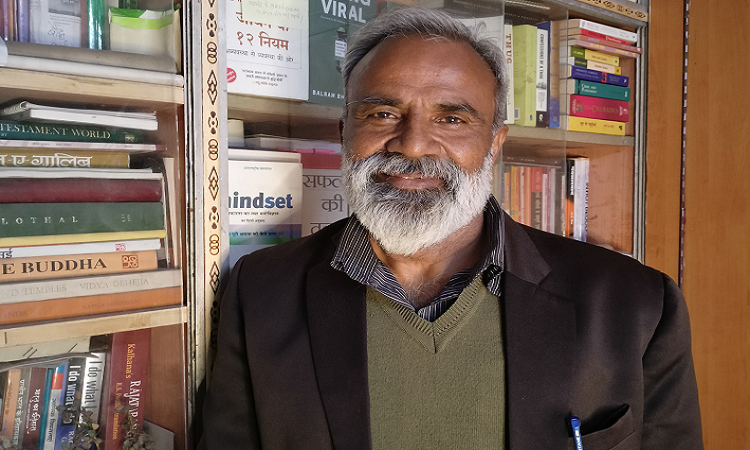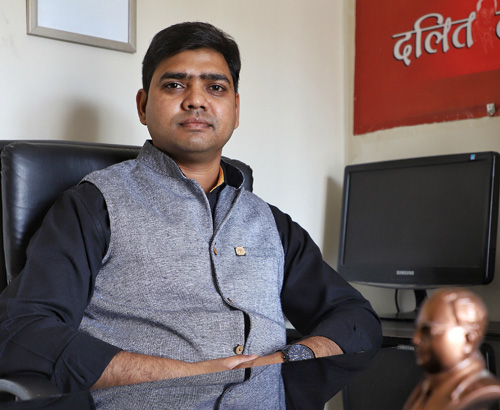 When a person lying in a corner of the village comes to live in the city and allegedly starts living in the midst of civilized society, there is a stir among the people around. He is harassed. People are not able to digest that till yesterday the person who used to serve at our place has come to live on an equal footing with us. This is to say of Ramesh Chand Gehlot i.e. Ramesh Bhangi.
When a person lying in a corner of the village comes to live in the city and allegedly starts living in the midst of civilized society, there is a stir among the people around. He is harassed. People are not able to digest that till yesterday the person who used to serve at our place has come to live on an equal footing with us. This is to say of Ramesh Chand Gehlot i.e. Ramesh Bhangi.
Ramesh Bhangi of Valmiki Samaj is a well-known name in the world of Dalit literature and is practicing law these days. When he came to live in a society in Ghaziabad, there was a buzz in the neighborhood. He was harassed. Dirt was poured into their water tank. The neighbors wanted Ramesh to leave the Bhangi Society, but he stayed put as we faced difficulties.
It is not that Ramesh Bhangi promoted his caste. Ramesh Bhangi says my certificate name is Ramesh Chand Gehlot. It is a common name, it does not reveal caste, but in Indian society your caste goes ahead of you. As the fragrance of a flower moves forward, so does your caste. Can’t escape caste. I have to say that India itself means caste. The identity of India is only from caste.
How did Ramesh Bhangi become Ramesh Gehlot, and why? When asked, Ramesh says, “All the books on sociology, all start with caste. All the books written on India start with caste. So the reality of India is caste, it is difficult to avoid it, so I added my caste to my name.
Ramesh Bhangi struggled a lot in order to come to Delhi from the Dalit colony of the village. He was born in 1968 in Malakpur village of Baghpat district of Uttar Pradesh, situated on the edge of Delhi. From here he took education up to primary. When he was studying in the fifth standard, he and other children of his caste were made to sweep the school. The teacher then used to keep a separate stick for the children of the Dalit community. A big stick, so that he can beat the children of Dalit society and also stay away from them.
Later in the day, Ramesh Bhangi came to Delhi. During this he also did the work of scrap. He used to go around the city to collect papers. Ramesh Bhangi did not give up the desire to move forward despite doing many odd jobs during the days of struggle. His inspiration was Babasaheb Dr. Ambedkar, whose biography he got to read in his childhood. Babasaheb’s life struggle instilled in Ramesh Bhangi the belief that life can be successful if there is struggle. Ramesh realized how caste works when he went to the exchange office to enroll for a job. There was a vacancy for the bus conductor. But the clerk sitting there told him to work as a sweeper, what would he do by working as a bus conductor? However, later he got a job as a bus conductor and then later he was appointed as a translator in the Central Translation Bureau of the Ministry of Home Affairs. After which he saw closely what the Dalit community had to face while living in the residential colony.
He saw casteism closely while living in different government and private flats. And when he came to live in Vasundhara area of Ghaziabad situated at the mouth of Delhi, then there was an earthquake in the society. Ramesh Bhangi recollects, “I joined a society of Vasundhara in 2001. Everything went well for a few years. Then in the year 2006, my neighbor asked my wife about caste. Then the wife told her caste. Since then she started cutting off from us and gradually other people of the neighborhood also came to know about our caste.
After the truth of Ramesh Bhangi’s caste came to the fore, many times the neighbors argued with him. He was harassed in various ways. Ramesh says- “Everyone wanted us to leave from there. But if we stick to our identity, the neighbors start harassing us indirectly. Like broke the chairs kept on my terrace. They break our pots, they break the plants in them. Let’s break the water boil inside the water tank. Since we do not see who has done this, we cannot even say anything. So in this way there is an attempt to harass us.”
After all, in a society where all the people are educated, intelligent, who are called civilized, why do those people do this? When I ask, Ramesh Bhangi says that the people of Dalit society are still not being fully accepted in the residential areas of the cities. If the person in front belongs to the Valmiki community, the discrimination against him increases further. People also want to escape from our shadow. This is a mental illness and if the person in front has a mental illness, then he should also get treated. I am a Victim.

अशोक दास (अशोक कुमार) दलित-आदिवासी समाज को केंद्र में रखकर पत्रकारिता करने वाले देश के चर्चित पत्रकार हैं। वह ‘दलित दस्तक मीडिया संस्थान’ के संस्थापक और संपादक हैं। उनकी पत्रकारिता को भारत सहित अमेरिका, कनाडा, स्वीडन और दुबई जैसे देशों में सराहा जा चुका है। वह इन देशों की यात्रा भी कर चुके हैं। अशोक दास की पत्रकारिता के बारे में देश-विदेश के तमाम पत्र-पत्रिकाओं ने, जिनमें DW (जर्मनी), The Asahi Shimbun (जापान), The Mainichi Newspaper (जापान), द वीक मैगजीन (भारत) और हिन्दुस्तान टाईम्स (भारत) आदि मीडिया संस्थानों में फीचर प्रकाशित हो चुके हैं। अशोक, दुनिया भर में प्रतिष्ठित अमेरिका के हार्वर्ड यूनिवर्सिटी में फरवरी, 2020 में व्याख्यान दे चुके हैं। उन्हें खोजी पत्रकारिता के दुनिया के सबसे बड़े संगठन Global Investigation Journalism Network की ओर से 2023 में स्वीडन, गोथनबर्ग मे आयोजिक कांफ्रेंस के लिए फेलोशिप मिल चुकी है।

